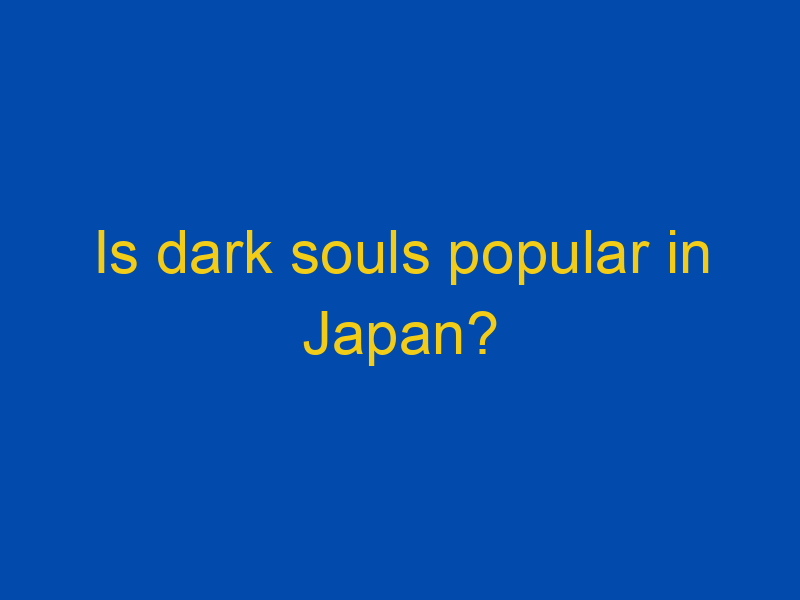Have you ever wondered if Dark Souls is as popular in Japan as it is in the Western world? This iconic game franchise has garnered a massive following from die-hard gamers worldwide, but its origins stem from the creative vision of FromSoftware, a Japanese game developer. Despite this, the level of popularity Dark Souls holds in Japan may surprise you. In this blog post, we’ll investigate the cultural impact of Dark Souls in Japan and uncover why this game franchise has continued to captivate millions of players worldwide. So, let’s dive in!
Understanding the Origins of Dark Souls: A Japanese Video Game Phenomenon
Dark Souls is a video game phenomenon that originated in Japan. From Software’s punishing role-playing game has developed a loyal fan base, selling over a quarter million copies in Japan alone. Dark Souls is known for its difficult gameplay, intricate world-building, and gothic-inspired aesthetic. Its popularity can be attributed to the strong tradition of RPGs and challenging games in Japan, as well as the innovative design choices made by the developers. The success of Dark Souls has even led to the creation of a sub-genre known as “Soulslikes,” with similar games like Bloodborne and The Surge being created by other studios. Understanding the origins of Dark Souls provides insight into the unique cultural influences that have contributed to its success and popularity. It is a testament to the creativity and innovation of Japanese game developers and the enormous influence of their work on global gaming culture.
Cultural Influences: How Japanese Mythology and History Shape Dark Souls
Dark Souls, a popular video game series, draws heavily from Japanese mythology and history to create its unique fantasy world. One of its most iconic game mechanics, cutting off the tail of an enemy to turn it into a weapon, comes from the classical myth of the eight-headed dragon Yamata-no-Orochi. The game’s references to the sun goddess Amaterasu and storm god Susanoo-no-Mikoto, as well as the slaying of dragons, are also influenced by Japanese folklore. The three Godly children of Gwyn, the game’s main character, have parallels with the Three Precious Children in Japanese mythology. Even the game’s religious structures have a Shinto or Buddhist influence with Catholic or Christian imagery layered over. While Dark Souls is often seen as a Western medieval fantasy, its themes, lore, and references are undeniably Japanese in nature. The game has a wide-reaching popularity partly due to its ability to successfully blend different cultural influences into a cohesive and immersive gaming experience.
The Reception of Dark Souls in Japan: Player Statistics and Reviews
Dark Souls has been a smash hit in Japan since its release, with more than a quarter of a million copies sold for the PlayStation 3 alone. The game quickly became Japan’s best-selling game and received rave reviews from players and critics alike. It outperformed its predecessor, Demon’s Souls, which debuted in 2009. The game also did very well overseas, especially on the PS3, although the Xbox 360 version of the game struggled to sell. Player reviews have been very positive, with many praising the game’s challenging gameplay and stunning visuals. Some have even described it as a masterpiece, making it one of the most popular and critically acclaimed games of recent years. The success of Dark Souls in Japan underscores the continuing popularity of console gaming in the country, which still maintains a vibrant and enthusiastic gaming community.
Comparing Eastern and Western Reception of Dark Souls
The Dark Souls franchise has gained a massive following worldwide, but the reception and popularity of the game seem to differ between Eastern and Western audiences. While it was created in Japan, it appears to be more popular in the United States and Europe. Namco Bandai’s annual financial report stated that the game sold 1.19 million units in the US and Europe by March 2012, with From Software announcing in April 2013 that it had sold 2.37 million units worldwide. However, in Japan, the game sold only around 350,000 copies. This discrepancy in popularity could be due to the differences in gaming culture and preferences. Handheld and mobile gaming are more popular in Japan, whereas Western audiences favor console gaming. It could also be attributed to the game’s difficulty, which may be more appealing to Western gamers. Regardless of the reason, the popularity of the Dark Souls series worldwide continues to grow, firmly establishing itself as a staple of the gaming industry.
The Impact of Dark Souls on the Japanese Video Game Industry
Dark Souls, while well-known and globally popular, has always had a special relationship with Japan, its country of origin. The first installment in the series sold half a million copies in Japan and 1.8 million in the US and Europe, indicating its massive appeal abroad. However, the console gaming market in Japan is significantly smaller than in Western countries, which makes it difficult for even popular games to crack the million units sold mark. This is why the fact that Dark Souls II only sold around 300k to 350k copies in Japan isn’t surprising. Nevertheless, the series still holds its own in Japan’s crowded market, with Bloodborne and Dark Souls III selling almost 150k and 250k copies, respectively, in their first weeks. Despite its relatively smaller market share, Japan still remains one of the most influential and innovative video game industries in the world, and Dark Souls’ success has undoubtedly had an impact on its gaming scene.
Japanese Player Communities and Dark Souls: Online Interactions and Fan Activities
Dark Souls, developed by From Software, was a game that quickly gained popularity in the West due to its unique online features, intense difficulty, and rewarding progression. However, its popularity in Japan, where it was created, was not as high. Despite this, there are still dedicated fan communities in Japan who enjoy the game. In Japanese player communities, there is a focus on helping others rather than just killing, which is reflected in the presence of summon signs during Japanese prime time in Dark Souls 1. Japan also received Bloodborne and Dark Souls 3 first, with initial sales of 150k and 250k respectively. From Software’s creator, Hidetaka Miyazaki, believes that Dark Souls’s global success can be attributed to its feeling of exploration, moments of shared triumph in online mode, and the ability for gamers worldwide to immerse themselves in the game. Japanese fans, although preferring MMOs, still appreciate the challenge and gratification found in Dark Souls. The game’s combination of online interactions and fan activities has helped create a passionate and dedicated fanbase worldwide.
The Role of Dark Souls in Esports and Competitive Gaming in Japan
Dark Souls is a beloved game in Japan, especially in the esports and competitive gaming scenes. It has sold over a quarter of a million copies for PlayStation 3 and remakes of the game continue to do well. Dark Souls also has a dedicated following for its punishing difficulty and rewarding gameplay. In fact, Dark Souls’ popularity in Japan has even been attributed to the rise of “Souls-like” games in the genre. This game has also had a strong impact on other esports and competitive games in Japan. For example, some professional players have honed their skills in Dark Souls to improve their spatial awareness and reaction times in games like Street Fighter and Tekken. Dark Souls has also inspired a variety of fan-made competitions and challenges for players to test their skills. Overall, Dark Souls has made a significant impact in the world of competitive gaming in Japan and continues to be celebrated among gamers.
The Future of Dark Souls in Japan: Anticipating New Releases and Trends
The future of Dark Souls in Japan is highly anticipated by fans of the punishing role-playing game. FromSoftware, the Tokyo-based studio that produces the game, has garnered a massive following worldwide for their insanely difficult games. The original Dark Souls game was released in 2011 and set a new standard for challenging gameplay. Since then, the series has continued to evolve, with refined iterations like Dark Souls III and the critically acclaimed Sekiro: Shadows Die Twice. Fans eagerly await news of upcoming releases and trends in the series, wondering what new challenges and enemies FromSoftware will create next. With more than a quarter million copies of the game sold in Japan alone, Dark Souls remains a bestseller in the country and continues to attract masochistic gamers worldwide. The future of Dark Souls in Japan looks bright, as the series shows no signs of slowing down.

Meet Michael Graham, the main author of SeekTraveler.com. With a wanderlust that knows no bounds, Michael has traversed more than 30 countries across the globe. From sun-soaked Caribbean islands to the ancient marvels of Europe and the captivating charm of Japan, he has witnessed the wonders of diverse cultures firsthand. Michael’s in-depth knowledge and contagious enthusiasm for travel will inspire you to pack your bags and embark on your own extraordinary journey.



